The Chinese Nationalist Party (KMT) yesterday appealed for unity as it sought to boost the election chances of Taipei mayoral candidate Sean Lien (連勝文) at an election eve rally, with dozens of speakers saying that the party, the city and the nation cannot afford to lose the election.
Held on Ketalagan Boulevard in front of the Presidential Office Building, the theme of the evening rally was “Taipei Sheng, Taiwan Win” (台北勝,台灣贏) — linking the election result of the capital city to the fate of the nation.
The slogan plays on the sheng character in Lien’s name “Sheng-wen” (勝文). Sheng means “victory” in Mandarin.
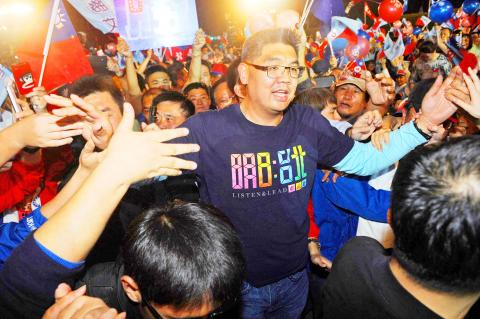
Photo: Chang Chia-ming, Taipei Times
New Party Secretary-General Lee Sheng-feng (李勝峰) was first to speak, highlighting the importance of the election to the future of the Republic of China (ROC), saying that a vote for Lien would be to defend the capital of the ROC.
Although Taipei has long been a stronghold of the KMT — voting patterns in past elections revealed a shift in blue-green support from 55-45 to 60-40 — Lien has consistently trailed his main rival, independent candidate Ko Wen-je (柯文哲), in opinion polls before Nov. 18.
To drum up enthusiasm among pan-blue supporters, President Ma Ying-jeou (馬英九) said that Taipei cannot afford to lose the election.
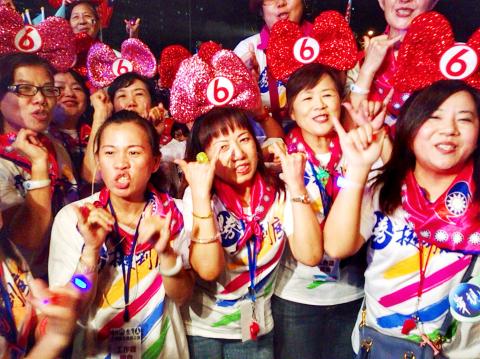
Photo: CNA
Taipei has developed into a “world-class capital” after 16 years of the KMT’s governance, starting when he was elected as Taipei mayor in 1998, Ma said.
Lien meets all the qualifications to become mayor of the capital because — as opposed to Ko — Lien has respect for women, is a professional with international vision and economic expertise, and he recognizes the so-called “1992 consensus,” which is essential to cross-strait relations, Ma added.
First lady Chow Mei-ching (周美青) urged everyone to cast their ballots.

Photo: Chang Chia-ming, Taipei Times
“The election result has not only to do with you, but also Taiwan, your children and the future of the ROC. Cast your vote and vote for your future,” she said.
Lien appealed to young people in his speech.
“The problem Taiwan is facing is neither one of class nor generation. It’s the economy. I have the ability to improve the economy,” Lien said.
Other speakers included former KMT chairman Wu Poh-hsiung (吳伯雄) — who had not made a public appearance since suffering a stroke in September that kept him from stumping for his son, John (吳志揚), who is running for re-election as Taoyuan commissioner — and KMT Legislator Ting Shou-chung (丁守中), who lost to Lien in the April party primary.
Lien’s father, former vice president Lien Chan (連戰), said that the Taipei race was a battle crucial to the future of not only Taipei and Taiwan, but also the ROC.
“Only when we win the election can we continue to move forward as a free and democratic territory, defend the values of fairness and justice, and expect limitless prospects for cross-strait relations,” Lien Chan said.
People First Party (PFP) Chairman James Soong (宋楚瑜) had said that the party would not take sides in the election, but the KMT had Yeh Sung-nien (葉松年), head of the Friends of James Soong Association, stump for Sean Lien at the rally.
The KMT estimated the turnout at about 80,000 people.
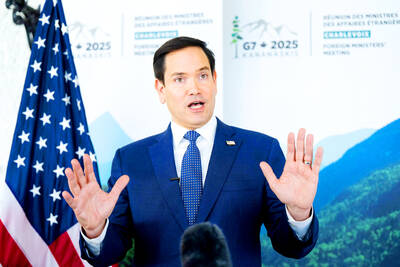
‘CROWN JEWEL’: Washington ‘can delay and deter’ Chinese President Xi Jinping’s plans for Taiwan, but it is ‘a very delicate situation there,’ the secretary of state said US President Donald Trump is opposed to any change to Taiwan’s “status quo” by force or extortion and would maintain that policy, US Secretary of State Marco Rubio told the Hugh Hewitt Show host on Wednesday. The US’ policy is to maintain Taiwan’s “status quo” and to oppose any changes in the situation by force or extortion, Rubio said. Hewitt asked Rubio about the significance of Trump earlier this month speaking with Taiwan Semiconductor Manufacturing Co (台積電) chairman C.C. Wei (魏哲家) at the White House, a meeting that Hewitt described as a “big deal.” Asked whether the meeting was an indication of the
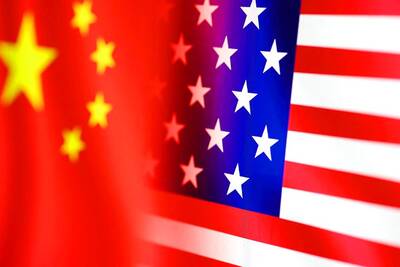
‘RELATIVELY STRONG LANGUAGE’: An expert said the state department has not softened its language on China and was ‘probably a little more Taiwan supportive’ China’s latest drills near Taiwan on Monday were “brazen and irresponsible threats,” a US Department of State spokesperson said on Tuesday, while reiterating Washington’s decades-long support of Taipei. “China cannot credibly claim to be a ‘force for stability in a turbulent world’ while issuing brazen and irresponsible threats toward Taiwan,” the unnamed spokesperson said in an e-mailed response to media queries. Washington’s enduring commitment to Taiwan will continue as it has for 45 years and the US “will continue to support Taiwan in the face of China’s military, economic, informational and diplomatic pressure campaign,” the e-mail said. “Alongside our international partners, we firmly
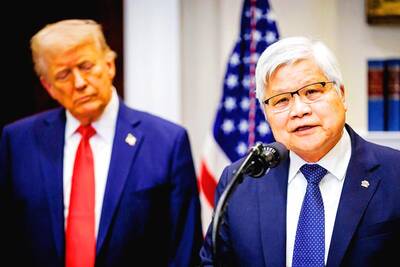
KAOHSIUNG CEREMONY: The contract chipmaker is planning to build 5 fabs in the southern city to gradually expand its 2-nanometer chip capacity Taiwan Semiconductor Manufacturing Co (TSMC, 台積電), the world’s biggest contract chipmaker, yesterday confirmed that it plans to hold a ceremony on March 31 to unveil a capacity expansion plan for its most advanced 2-nanometer chips in Kaohsiung, demonstrating its commitment to further investment at home. The ceremony is to be hosted by TSMC cochief operating officer Y.P. Chyn (秦永沛). It did not disclose whether Premier Cho Jung-tai (卓榮泰) and high-ranking government officials would attend the ceremony. More details are to be released next week, it said. The chipmaker’s latest move came after its announcement earlier this month of an additional US$100 billion

Authorities yesterday elaborated on the rules governing Employment Gold Cards after a US cardholder was barred from entering Taiwan for six years after working without a permit during a 2023 visit. American YouTuber LeLe Farley was barred after already being approved for an Employment Gold Card, he said in a video published on his channel on Saturday. Farley, who has more than 420,000 subscribers on his YouTube channel, was approved for his Gold Card last month, but was told at a check-in counter at the Los Angeles International Airport that he could not enter Taiwan. That was because he previously participated in two